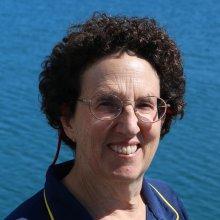
Karen Wishner
Tell us about your work / research. What kinds of things do you do?
I am a seagoing biological oceanographer specializing in deep-sea biology and marine zooplankton ecology. I also teach an undergraduate Deep-Sea Biology class. I have worked on zooplankton-environment interactions in the Gulf Stream, Georges Bank, Arabian Sea, and Eastern Tropical Pacific. Of special interest to this expedition, I studied zooplankton-benthos-environment interactions on a seamount (Volcano 7) that extends up into the low oxygen part of the water column (oxygen minimum zone) not too far from the present cruise location. We found strong zonation of benthic animals on the seamount that was related to the oxygen gradient in the water column. At depths of very lowest oxygen, there were almost no large benthic animals, while slightly deeper where oxygen was a bit higher, large animals were abundant. On a different cruise to a volcano in the Caribbean, we found dead midwater shrimp that had apparently been trapped in the volcanic crater during their daily migration and killed by toxic volcanic effluent. I hope to follow up on these ideas during the present cruise. The low oxygen mid-depth water characteristic of this geographical region should influence animal distributions on these volcanoes, and the rugged topography offers many different habitats for benthic animals.
What sparked your initial interest in your career?
In college, I was a biology major. I had the opportunity to work for several summers with professors at marine labs and also took a summer field class on invertebrates. I chose to go to graduate school at Scripps Institution of Oceanography because of all the ships and seagoing possibilities. There, I became interested in deep-sea biology and zooplankton and had the opportunity to create my own interdisciplinary niche. I went to sea with a geological group, attached a plankton net to their towed vehicle, and collected zooplankton near the deep-sea floor.
Who influenced you or encouraged you the most?
My parents and junior high school science teacher were the first to directly encourage me in science. I have been fortunate to have had some excellent teachers and unique opportunities in college and beyond. Helpful mentors and intellectual colleagues have been essential in my professional career.
What element of your work / study do you think is the most fascinating?
It is exciting to put all the data together and figure out what patterns exist and what might cause them. In my case, determining the factors that affect animal distributions in the water column or on a seamount has been a fun and rewarding challenge.
What other jobs led you to your current career?
I have been on the faculty of the University of Rhode Island since graduate school. Summer jobs at marine labs during college helped me realize that oceanography was exciting and important.
What are your degrees and certifications?
Bachelor of Arts in Biology--University of Chicago; Ph.D.--Scripps Institution of Oceanography, University of California San Diego
What are your hobbies?
My husband and I enjoy swing dancing and traveling.
What advice would you give to someone who wants to have a career like yours?
My strongest piece of advice is to seek out and take advantage of unique opportunities. Get basic skills and work hard in your classes, but be sure to take some classes or do something adventurous beyond your present experience.
How did you get involved with the Nautilus Exploration Program? How did you get on the ship?
I take my Deep-sea Biology class to the Inner Space Center every year. I previously worked with Dr. Carey on another project and was excited when he and other expedition leaders invited me to participate.
Expeditions
Karen participated in the following Ocean Exploration Trust expeditions:
